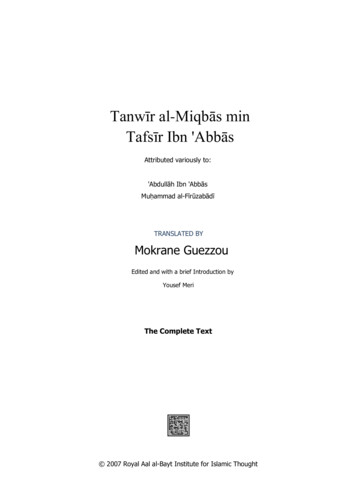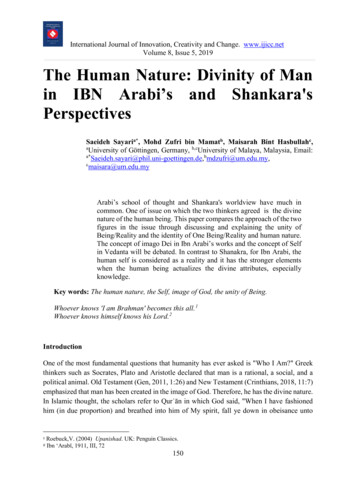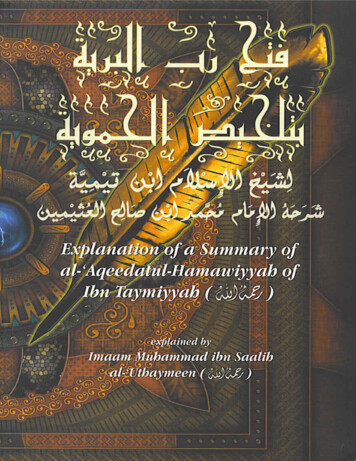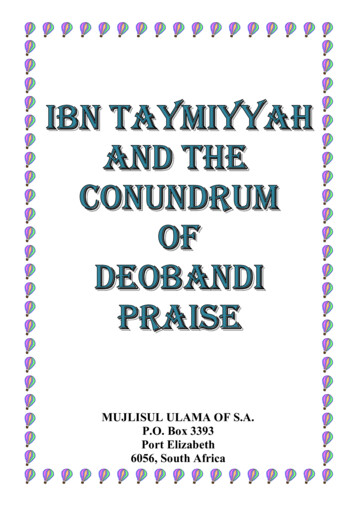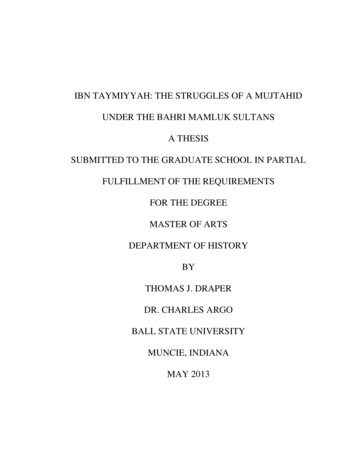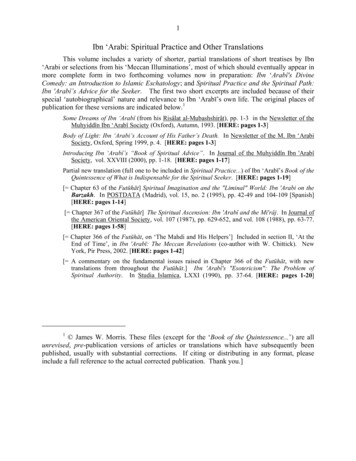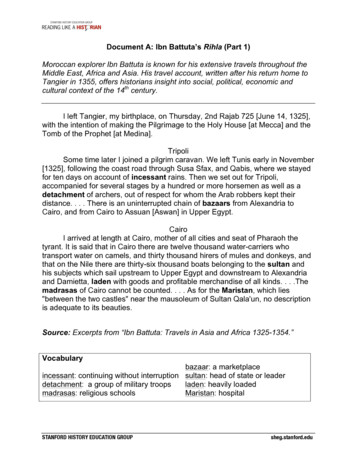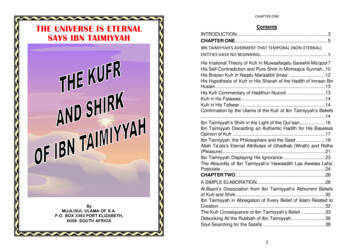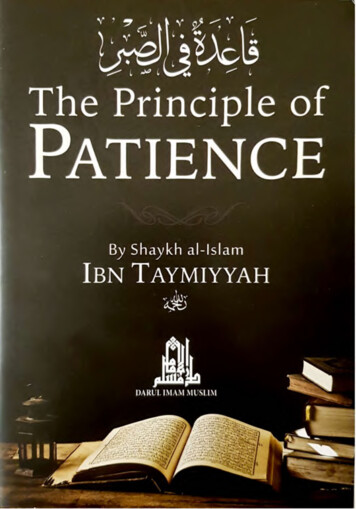
Transcription
By Shaykh al-lslamIbn Taymiyyahate
DARUL IMAM MUSLIMAlways support the publisherby purchasing the originalcopy of the books.This Ebook is meant for thosewho have no way to accessthe book.SUNNICONNECT. COM
The Principle of Patiencelsl Edition Darul Imam Muslim 2015 C.E. / 1436 A.H.All rights reserved. No part of this publication may be re produced, photo-copied, scanned, stored or transmitted inany other shape or form without the prior permission ofthe copyright owners.Published by:Darul Imam im.comCover design & typesetting by:Ihsaan Design, wwvv.ihsaandesign.comDisclaimer:Darul Imam Muslim docs not necessarily hold all the same viewsas the authors of their publications and therefore, do not acceptany responsibility for any loss or damages caused in relation totheir publications and ideas expressed therein.
The Principle ofPatienceIBN TAYMIYYAHTranslated by Abu Fatimah Azhar MajothiEdited by Umm ‘Abdillah F. KhanomUAKUL IMAM MUSLIM
Arabic Transliteration Chartth d*so*it f t kh bva/i/ubCiJrJ4J*shHdh §shJ*t‘a / *iz# qJnjmflJkyS?wJh1'*uj-acr' L/T aw / auy- ay / ai
TRANSLATOR’S PREFACEAll praise is due to Allah and may His peace and mpanions. As for what follows:Abu ‘l-cAbbas TaqT ‘1-Din Ahmad b. cAbd al-Hallm b.‘Abd al-Salam al-Hirani, better known to the world asShaykh al-Islam Ibn Taymiyyah, died at the age of 67having spent his entire life serving Islam and its stigation of the Quran, Sunnah and statements of theImams of the salaf, and he would issue fatwas and authorbooks based on them. His enemies and enviers did theirutmost best to vilify him before the leaders of the time andaccuse him of various blasphemies and transgressions in thereligion. As a result of their schemes, Ibn Taymiyyah wasimprisoned on seven occasions and served sentences whichtotalled approximately five years and some days across thelast 35 years of his life (693-728 A.H.). It was also inprison, that his soul was returned to its Maker. Hisstudent, Ibn Abd al-Hadl states:The period of his (final) sickness was 10 or so daysand most people were unaware of it and so theywere not taken by surprise except on hearing his5
obituary, after which there was severe sorrow andabundant crying and sadness; his close relatives andcompanions entered his (cell) and the peoplecrowded the gate of the fortress (where he wasimprisoned) and its pathways, the Central Masjidof Damascus was full and they prayed over him andcarried him (to his grave) over their heads. MayAllah have mercy on him and be pleased with him.Ibn Taymiyyah's funeral was attended by some 10,000 or sopeople - a sign and attestation to his greatness and hisacceptance among the people of knowledge and the peoplein general. And in this respect, Imam Ahmad reportedlysaid:Say to the people of innovation: between us andyou is the day of funerals!Although Ibn Taymiyyah was imprisoned so many times,he was never dismayed and continued to call to the trutheven if it was at the expense of the people's pleasure. Hewas a prisoner content with his Lord’s decree, patient withwhat befell him and cognisant of the hidden blessings ofbeing imprisoned for nothing but a true and righteouscause.6
During the year 709 A.H., Ibn Taymiyyah was releasedfrom the prison in Egypt and honoured by Sultan Nasir,who had been absent from Egypt and was unaware of whathad transpired regarding his imprisonments. The Sultan satwith Ibn Taymiyyah in private and showed him somefatwas written by his enemies stating that he should beexecuted. The Sultan offered to execute some of gression against him, but instead of taking revenge,Shaykh al-Islam praised them and said:If they are gone, you will never find in your landthose who are similar to them. As for me, thenthey are acquitted with respect to my right and myown self.This indicates Ibn Taymiyyah’s tremendous tolerance overhis enemies and his mercy for them. By pardoning them,he managed to save their lives. When this news reachedQadT Ibn Makhluf al-Malikl, Shaykh al-Islam’s nemesis, hesaid:We have not seen anyone more forgiving than IbnTaymiyyah (from the people). It was not possiblefor us to carry out our efforts regarding him, butwhen he was able over us, he pardoned us.7
Ibn Taymiyyah’s most illustrious student Ibn Qayyim, sonment, stated:And Allah knows that I did not see anyone live apurer life than him ever. despite what he sufferedfrom imprisonment, restraint and exhaustion, hewas from the purest of people in living and ed; the brightness of delight showed on hisface.Ibn Qayyim also relates the following famous words utteredby Shaykb-ul-Islam during his imprisonment:What can my enemies do to me? My Paradise andGarden are in my heart, wherever I go they arewith me,they never separatefromme.Myimprisonment is a spiritual retreat. Killing me willbe martyrdom and removing me from my land istourism.Such was his contentment with his Lords decree that heviewed imprisonment, rather all trials, as a blessing. Hesaid:8
Allah has opened to me in this fortress during thistime (deeper) meanings from the Quran and manythings from the sciences of knowledge which manyof the scholars have been prevented from.And:If I was offered the amount of gold equivalent tothis entire fortress, it would be equal to e reflected over his final imprisonment and said:I could never repay them for what has resultedfrom good to me in it (the prison).1The many instances of Ibn Taymiyyah’s exemplary patiencehave amazed all those who have come to know of the trialshe endured in upholding the traditions of the salaf. To mydelight, I came across a treatise entitled Qa'idah fi ‘l-Sabr1For references, refer ro Muhammad ibn ‘Abd al-Hadl al-MaqdisI, Al-Imtisdr fi Dbikr Ahwal Qamic al-MubtadiHn wa Akbir al-MujtabidinTacjl al-Din Abl l’-‘Abbas Ahmad ibnTaymiyyah; Shams TDlnMuhammad ibn Abi Bakr Ibn Qayyim al-Javvziyyah, Ai-Wdbil al-Sayyibmin ‘l-Kalim al-Tayyib.9
included in J&mV al-Masd’il (1/165), a collection of IbnTaymiyyall’s shorter works compiled by our respectedShaykh and Muhaqqiq Muhammad cUzair Shams. Although2the work is short", it nonetheless contains much benefitand lessons and illustrates Ibn Taymiyyah’s psychologicaldisposition which strengthened him during his trials andtribulations, and furthermore allowed him to find peaceand contentment in situations where most would only fallinto despair and depression. Perhaps it will direct ussimilarly when we face inevitable times of hardship anddifficulty.Written by one in need of Allah’s mercy,Abu Fatimah Azhar Majothi13 Jamada al-Ula 1435 A.H. - Corresponding to 15 March 20142 The original treatise Qa'idah fi ‘l-Sabr is thought to be part of a largerwork on patience and gratefulness which is no longer extant. This isindicated by Ibn Taymiyya’s introduction in which he clearly sets outtwo principles, patience and gratefulness, but only discusses the former.Furthermore the treatise appears to end abruptly at the mention of thelatter principle. If this is indeed a portion of a larger work, then it islikely to be the one referred to by Ibn ‘Abd al-Hadl in Al-Instisdr asQa'idah fi‘l-Sahrwa‘l-Sbukr (TheGratefulness). Allah knows best.10Principle of Patience and
The Principle of Pat iencelIN THE NAME OF ALLAH,THE ALL-MERCIFUL, THE BESTOWER OF MERCY.Shaykh al-Islam Ibn Taymiyyah ajfe said:Allahhas prepared some good for His believing slaves inevery stage (of life): they are always experiencing someblessing from their Lord, whether they encounter whatthey like or dislike. And Allah has made His judgmentsand decrees which He ordains and makes possible for themlike trade by which they profit from, or pathways by whichthey are able to reach Him; just as it is affirmed in theSahib, from the believers’ Imam and master (the Prophetwhose name, when every nation will be called by theirleaders on the Day of Standing, will be referred to whencalling them:Amazing is the affair of the believer. Indeed all ofhis affairs are good! And that is not for anyonebut the believer. If good befalls him, he isgrateful and so it is good for him; and if harm11
The Principle of Patiencebefalls him, he is patient and so it is good forhim.3This hadith is general and incorporates all of Allah’sdecrees for His believing slave and indicates that they aresomething good if a slave is patient when the decree iswhat is disliked and grateful when it is what is liked. Infact, this concept falls under the title of ‘faith’ {Eeman)yjust as some of the salaf mentioned, that “faith has twohalves: one half is patience and the other is gratitude.” This isbased on the statement of Allah the Most High:Indeed in that are signs for everyone patient andgrateful.4If the slave of Allah considers the entire religion, he willsec that it returns in its entirety to patience and gratitude.This is because there are three types of patience:3 Recorded by Muslim (2999).‘ Surah Ibrahim (14):5.12
The Principle of PatienceTHE FIRST TYPE: PATIENCE IN CARRYINGOUT ACTS OF OBEDIENCE (TO ALLAH). The slave(of Allah) almost docs not carry out the order except afterdemonstrating some kind of patience, perseverance andstruggle against his inner and open enemy. Thus hisperformance of the obligatory duties and recommendedones are according to this patience.THESECONDTYPE:PATIENCEINREFRAINING FROM PROHIBITIONS. Certainly thesoul andits inclinations, Satan’s allurement and badcompany all invite and encourage one to sins. Therefore, bythe strength of one’s patience, one is able to leave them.Some of the salaf said: aGood actions are carried out by boththe good-doer and evil-doer but no one is able to leave sinsexcept the truthful one.”THE THIRD TYPE: PATIENCE WITH WHATONE IS AFFLICTED BY, WITHOUT CHOICE. This isof two types:i.A type which the creation has no control over,such as sickness and other kinds of God-sentafflictions; such matters facilitate one’s patience ashe isc able to witness in them the decree of Allahand fate and that people have no ability to alter13
The Principle of Patiencethem. Thereby, a slave of Allah bears patientlywhether he is compelled or given a choice.If Allah opens the slave's heart to the doors ofcontemplation over the benefits of the afflictionand all that it contains of favours and grace, heturns from being patient to being grateful andpleased with it. In truth, the affliction transformsinto a blessing and both his heart and tonguecontinueto call out:“My Lord! Helpme toremember You, thank You and worship You well! henedthestrengthorandweakness of the slave’s love for Allah. In fact, weoften find this is a reality of life, as the poet said,addressing his beloved (who harmed him in someway), “Though it grieves me that you defamed me withevil, It pleased me to know that I crossed your mind!'ii.A type which reaches him at the hands of thepeople with respect to his wealth, honour or seif.This type is very difficult to bear with patiencebecause the soul feels the pain, it dislikes beingA prophetic supplication as recorded by Ahmad (5/244), Abu Dawud(1522) and al-Nasai (3/53).14
The Principle of Patienceoverpowered and so it seeks revenge. No one is ableto bear this type of affliction with patience exceptthe Prophets and the truthful. When our Prophetwas harmed, he would say: “May Allah have mercyon Musa! He was afflicted with greater harms than thisbut bore it with patience!'*And the Prophetinformed the people thatone of the past Prophets was beaten by his peopleand said: “0 Allah! Forgive my people for indeed theyknow not!It has further been reported from theProphet that something similar happened to himatthehandsof hissupplication) like this.peopleandhesaid(aThere are three matterswhich are combined in the supplication, ness for them and excusing them for theirignorance.The end result of this type of patience is victory,honour, happiness, safety and power in the cause of6 Recorded by al-Bukhari (3150) and Muslim (1062).7 Recorded by al-Bukhari (3477) and Muslim (1792).H The supplication was made at the Battle ol Uhud and is recorded byal-Tabarani in Mu'jim al-Kabtr (5694).15
'I'hc Principle of PatienceAllah, in addition to the increase of ones love forHim, the peoples’ love for him (the slave) and anincrease of knowledge. Accordingly, Allah the MostHigh states:f . ,/jf f»./, / 0y yiAnd We made from among them leaders guidingby Our command when they were patient and[when] they were certain of Our signs.vBy patience and certainty, one is able to attain leadership inthe religion; if one was to add to this patience, strength ofcertainty and faith, he would advance through the levels ofhappiness by the grace of Allah the Most High;aitj c lio ail J-ii Jjj’jThat is the grace of Allah, bestowed on whomHe wills, and Allah is the owner of tremendousgrace.107 Surah al-Sajdah (32):24.1,1 Surah al-Hadid (57):21.16
The Principle of PatienceThis is why Allah the Most High states:S 'J- .\ui«cliLu l JI44 oy] i'*' * \4 4J3 ,‘0’ ,iuuLAnd thereupon the one whom between you andhim is enmity [will become] as though he was adevoted friend. But none is granted it exceptthose who arc patient, and none is granted itexcept one having a tremendous portion.11MANY FACTORS AID THE SLAVE (OF ALLAH) INPRACTISING PATIENCE:1That one attest to the fact that Allahis thecreator of the slaves' actions, their movements, theirstationary positions and their wishes; whatever Allah wills,is; and whatever He wills not, cannot be; no atom in theworld, be it the heavens or the earth, moves except by HisiiSurah al-Fussilat (4l):34-35.17
The Principle of Patiencepermission and will. Thus, the slaves arc like instruments(yet they have free-will), so look towards the One whoempowered them over you and do not look at their (had)actions towards you, it will relieve you from worry, griefand sorrow.Of 1 hat the slave (of Allah) attests to his sins, and thatAllah has only allowed them (his enemies) controlover him due to his sins, just as Allah the Most Highstates:And whatever of misfortune befalls you, it isbecause of what Your hands have earned, and Hepardons much.12Thus, when the slave attests that everything which reacheshim from dislikeable things is caused by his sins, he busieshimself with repentance and seeking forgiveness from them12 Surah al-Shura (42):30.18
The Principle of Patiencedue to which he has been overcome by the people’scensure, blame and slander. And when you see a slaveaffected by people when they harm him but he does notreproach himself and seek forgiveness, then know that hiscalamity is truly a great one, but if he repents and seeksforgiveness, saying “this is because of my sins,” it turns out tobe a blessing in respect to him/AlI b. Abi Talib 4* said astatement which is from the gems of speech: “Let a slavenot have hope in anyone but his Lord [for He alone causes goodand repels evil], nor let a slave fear anything but his sin [due toits consequence overpowering him].” And it is reported fromhim and others that: “No calamity befalls a person except dueto sin, and it is not lifted except by repentance. ”"2 That the slave (of Allah) realises the fact that thebest of rewards which Allah has promised, is forwhoever pardons and is patient, just as He the Most Highstates:Vr-ut! ' i ’ f iLiU2 P«\ '&**?*'LgJLA 4-Lj w-*** - , Oli 4»l The Recompense for an evil is an evil likethereof,butwhoever19forgivesandmakes
The Principle of Patiencereconciliation, his reward is due from Allah.Verily, He likes not the oppressors, polytheists,and wrong-doers.13Mankind is of three types in relation to reciprocation ofharm:i.The oppressor who takes more than his right;ii.The sparing one who takes the value of his right;iii.The good-doer who pardons and leaves off hisright.Allah mentioned the three types in this verse, the first partisdirectedtothesparing ones,itsmiddletotheforerunners (the good doers) and its end to the oppressors.And a caller will testify on the Day of Standing saying:uLet him rise whoever s reward is binding upon Allah (torecompense by His will alone)!"1 * and none will step forwardexcept the one who forgave and made reconciliation. Whenhe (the slave) sees for himself along with that, that one13 Surah al-Shura (42):AO.Recorded by Ibn AbT Hatim and others.20
The Principle of Patienceloses reward due to retaliation and taking (one’s right inthe world), patience and forgiveness becomes easy for him.tJL That the slave (of Allah) realises the fact that when he forgives and reacts well, it causes him to haveopen-heartedness towards his fellow brethren, and etaliation or intending evil. And one obtains the sweetnessof pardoning which increases his delight and benefit, be itimmediate or in the distant future, over any benefit gainedby retaliation. And such a person is included in thestatement of the Most High:-/» "* *Verily, Allah loves the good doers.15Thus, the slave becomes a beloved of Allah, and hiscondition becomes like one from whom a dirham is taken,but he is compensated with thousands of dinars by whichhe rejoices in what Allah has bestowed upon him with theutmost joy possible.15 Surah Al ‘Imran (3): 134.01
The Principle of Patiencec1 hat the slave (of Allah) acknowledges that nobodyever retaliates for himself except that it causeswithin him humiliation; and when he pardons, Allah theMost High honours him. This is included in what thetruth fill and trusted one (i.e. the Prophet ) informed of,when he said:AJlah does not increase a slave for his action ofpardoning except in honour.16Thus, the honour which one achieves by pardoning is morebeloved to him and beneficial than the honour he vesretaliation) is honour outwardly but causes shame inwardly,and pardoning may be humiliating inwardly, but it alsocauses honour inwardly and outwardly.And it is from the greatest benefits: the slave (ofAllah) realises that recompense is in accordancewith its like, that he himself is a sinner, an oppressor, and16 Recorded by Muslim (2588).22
The Principle of Pat iencethat whoever pardons people, Allah pardons him, andwhoever forgives them, Allah forgives him. Thus, when herealises that his pardoning, excusing and behaving wellwith them -despite their ill treatment of him- is a cause ofAllah recompensing him with the like of his actions byforgiving him, pardoning him, and doing good to him despite his sins, and in addition to this, pardoning andbeing patient is made easy for him. And this benefitsuffices the intelligent one.H/"That the slave (of Allah) knows that when hebusies himself with retaliation and reciprocation, histime is wasted, his heart is divided and he loses benefitswhich are not possible to make up for; and perhaps this isharder upon him than the calamity which reached him dueto them. Thus, if he pardons and excuses, his heart andbody are free to achieve the benefits which are moreimportant to him than retaliation.Q.That the slave (of Allah's) retaliation, his taking(his right) and his standing up for it, is merely forhimself and for his revenge, but indeed the Messenger of23
The Principle of sidering he was the best of Allah’s creation and themost noble of them with Allah, he did not take revenge forhimself - even though harming him was a (futile) attemptto harm Allah and is connected to the rights of thereligion, and his self was the noblest, the most pure, mostrighteous and furthest from every dispraised characteristic,and the most closest to every beautiful characteristic - yetdespite this, he did not take revenge. Therefore how canany of us take revenge for ourselves while knowing thefaults and evils within us? In-fact, the man who knows hisworth, does not consider himself worthy of taking revenge.For him, his self does not have enough value to oblige himto champion his cause.Q.If the slave (of Allah) is harmed because ofsomething he did for the sake of Allah (and whichwas according to His Sharicah)y or for something which hewas commanded to do out of obedience to Him orprohibited from doing due to it being disobedience toHim, patience is binding upon him and there is noretribution for him; he has been harmed for the sake olAllah so his reward is with Allah. Due to this, when the2*1
The Principle of Patiencemujahidun in the path of Allah lose their hlootl and wealthfor Allah’s sake, and these things arc not insured, as He haspurchased from them their selves and their wealth, it is upto Him to pay the price and not the creation. So whoeverseeks the creation to pay the price, there is no price forAllah to pay for him, for whoever s loss is for the sake ofAllah, it is up to Allah to take care of his offspring (andother responsibilities).And if the slave (of Allah) was harmed due to a sin,then let him turn to himself with blame; and by himblaming himself it will busy him from blaming the onewho harmed him. And if he has been harmed in respect tohis wealth, then let him resolve to practise patience, forindeed recovering one’s wealth is a matter more bitter thanhaving patience. Thus, whoever cannot observe patienceover the midday heat, rain, snow, the difficulties ofjourneys and highway robbers, then there is no need forhim to carry out trading. And this is a matter commonlyunderstood amongst people: that whoever is sincere inseeking something, the patience observed in seeking it isrecompensed in proportion to his (level of) sincerity.25
The Principle of PatienceinIII That the slave (of Allah) realises the factthat Allah is with him when he is patient, aswell as Allah’s love for him and His being pleased with himdue to it; so whoever Allah is with, He repels from him thevarious kinds of harm and injury which none from Hiscreation can repel. Allah the Most High states: 4»l 0] Ijwr-lj.And be patient; surely, Allah is with those whothe patient ones.17And Allah the Most High states:Jt.And Allah loves the patient ones. 18Thattheslave(of Allah)realisesthatpatience is half of faith; he should not17 Surah al-Anfal (8)/i6.,H Surah AI ‘Imran (3): 146.26
The Principle of Patiencesubstitute even a portion of bis faith (in Allah) to havingfaith in aiding himself for if lie practises patience, then hepreserves his faith and protects it from decreasing. AndAllah the Most High defends those who believe.a o.IThat the slave (of Allah) realises that hispatience is a resolution from him against hisown self and an act of his mastery and superiority over it.And when the self is subdued and overpowered by aperson, it is not pleased with its subjugation, captivity or itbeing thrown into destruction. But when a person isobedient to his self and pays attention to it, and is subduedby it, it continues this way until it destroys him, or themercy from his Lord reaches him. Therefore, had therebeen nothing in patience except its mastery over the selfand Satan, then it would manifest the hearts hted,strengthened and repels his enemy thereby.1 a,IThat the slave (of Allah) knows that if hepractisespatience,thenAllahwillundoubtedly aid him. Certainly Allah is the guardian over27
The Principle of Patiencethe patient one who defers his oppressor over to Him. Butwhoever attempts to gain victory by taking a stand forhimself, then Allah entrusts him to his own cause, and heremains the only helper to himself. So what comparison isthere between the one whose aid is Allah, the best ofhelpers, and the one whose aid is himself, the mostincapable and weakest of helpers?!1A./—JU That the slave (of Allah’s) patience with the* one who harms him and bearing it, inaddition to the people rebuking the wrongdoer, leads hisopponent to leave oppressing others, feel remorse and seekpardon. Thus, the wrongdoer recants after harming thepatient person out of shyness and regret over what hecommitted; moreover, he may also become a supporter tohim. And this is the meaning of the statement of Allah theMost High: ». *06" Sj'JS-kiAjuj 1 Jjl liji *-L.) i*3) L JlL 9 2H
The Principle of Pat ienceAnd not equal arc the good deed and the had.Repel [evil] hy that [deed] which is better; andthereupon the one whom between you and him isenmity [will become] as though he was a devotedfriend. But none is granted it except those whoarc patient, and none is granted it except onehaving a great portion [of good].191 cPerhaps one’s revenge and reciprocation maybe a cause for the increase of his opponent’sevildoing, empowering him and his schemes in afflictingdifferent kinds of harms which is something witnessed (inour time). If the slave (of Allah) is patient and pardons, hewould be secure from this danger and the intelligentperson would never choose the greater of two harms procation led to an evil which a person then foundhimself unable to defend himself from? And how oftenhave lives, leadership, wealth and kingdoms been lost19Surah al-Fussilat (41):34-35.29
71jc Principle of Patiencewhich wouldhave remained,hadthe oppressed onepardoned?IThepersonwhoaccustomshimself toseeking revenge and not practising patiencewill inevitably fall into wrongdoing. This is because thesoul does not restrict itself to the precise level of justicedue to it, unknowingly and unintentionally; perhaps it mayalso be unable to restrict itself to the required level ofupholding the truth, for anger leads a person to anextreme, whereby he does not comprehend what he issaying or doing. Thus when the slave (of Allah) is the oneoppressed, he anticipates support and honour (from Allah),whereas if he becomes an oppressor, he anticipates Allah’shatred and punishment.1 HI/"This oppression which the slave (of Allah)has suffered is a factor by which either hissins will be expiated or he will be raised in status. So if hesought revenge and did not practise patience, it will not bean atonement for his sins, nor an elevation of his status.30
The Principle of PatienceIQ.1 he slave (of Allah's) pardoning and patienceare from the greatest soldiers belonging tohim against his opponent. Certainly whoever practisespatience and pardons, will find they are a cause for hisenemy's humiliation and fear, and his dread of him andothers, who will not stay silent about his opponent even ifhe does. If one retaliates, all of the above is forfeited.Hence, you find many people who, when they curse orharm someone, they love to receive the same treatmentback; if the harm is reciprocated, they find ease and cast offthe burden they held.1 G If one was to pardon his opponent, thiswould lead the opponent to feel that thevictim is superior to him and that indeed he has profitedover him (by forgiving him); thus the opponent does notcease to perceive himself inferior to him. This is sufficientenough as a virtue and honour of pardoning others.If one pardons and forgives, then this is agood deed which will result in another good31
The Principle of Patiencedeed and that one would result in another good deed andso on and so forth. Thus, the slave (of Allah’s) good deedswill never cease to increase, for the reward of doing good isgood, just as the recompense of evil is evil. It may also be afactor of his salvation and eternal bliss, but if he was toseek retaliation and avenge himself, then (all of) that wouldcease to exist.The second foundation is gratefulness and it is to workin obedience to Allah the Most High.This treatise ends with the praise ofAllah the Most High.And may He send peace and blessings on our master Muhammad,his believing household and Companions.32
NEW PUBLICATIONS BYDARUL IMAM MUSLIMWORKBOOKS FOR ISLAMIC STUDIESI,The Causes BehindDifferences ofOpinionf'By Sh«ykh'.-MuhammadHayat Al-Sindi*THE QURANPART 30 jt1 WLX [MxMDMttA IMAM Ml 33 JU--WORKBOOKS FOR ISLAMIC STUDIESARABIC GRAMMARAL-AJURRUMIYYA***/*Miy)» )«*?» Ua ShW d Vi» J«l 14)1.474 4.11. lh A44KMH U Ik* K.j.bAIMJUA IMAM MUttJMlT)4.74J AJI.llit VU* MMulLJl VlukAmmjJ Wu feimud t-Sial SM UKm(TZI'ltlAJD& *JOA»lAMkC«LfUFind out more about our titles at:www. darulimammuslim. comJoin us at facebook.com/darulimammuslim
The Principle ofPATIENCENote: Darul Imam Muslim is a web-based publishing house.You can connect with us via. our social pages (Facebook/Twitter) or simply send us your queries/comments via. our contactpage. Darul Imam Muslim is an Islamic publishing housewhich was first established in Leicester, UK, in the year 2008.Our aim is to produce reliable Islamic books in the Englishlanguage which will encourage a better understanding otclassic Islamic thought and theology.Our titles are carefully selected for their balanced evi dence-based arguments and uniqueness and we are especiallyinterested in addressing topics which are not often discussedbut are clearly misunderstood.To date, we have published the following books, which areavailable both in paperback format and digital. Click on publi cation to find out more:UNITED KINGDOM RETAIL PRICE: 2DARl'l IMAM MI S! IM
Ibn Taymiyyah, died at the age of 67 having spent his entire life serving Islam and its sciences. He spoke the truth as he saw it, after careful investigation of the Quran, Sunnah and statements of the Imams of the . salaf, and he would issue fatwas and author books based on them. His enemies and enviers did their
